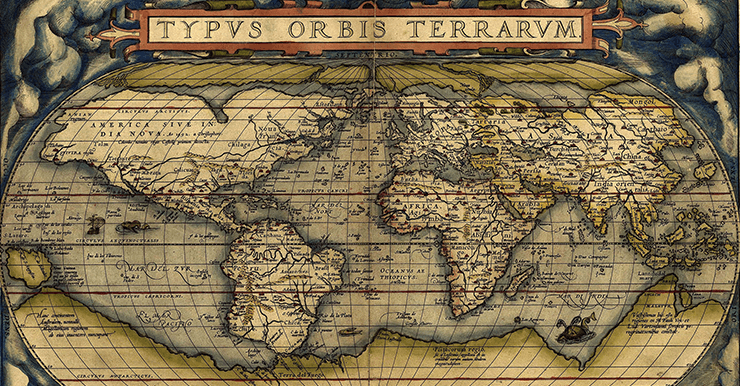A few years ago, I read Kalpa Imperial and The Three Body Problem in quick succession, and I said to myself, I have GOT to make my SFF reading more global! And if there’s one thing I’ve learned from living overseas, it’s that the world is a bigger, deeper place with more richness in so many more ways than I ever could have imagined.
Like many readers, I try to seek out authors from all different perspectives and walks of life. It makes my reading experience that much broader and fuller and more enjoyable—and also, I think, helps me understand more of the world and thus become a more empathetic human. As geographic diversity in particular has become an important piece of that awareness, I’ve also become especially interested in reading more work in translation, and I want to give a shoutout to Rachel Cordasco’s website SF In Translation for the great reviews and recommendations. If you’re interested in spreading out your reading, that’s a good place to start. Here’s hoping we can increase the market for authors in all places, both Anglophone and non-Anglophone, and get more books to read from everywhere!
Now, to tempt you, here are five knockout reads from five different continents.
Africa
Kintu, by Jennifer Nansubuga Makumbi
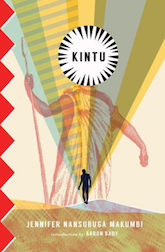 Kintu is spectacularly popular in Uganda, and is described in the introduction as being a book written unapologetically “for Ugandans.” In other contexts, I’ve been in that place where something felt like it was written “for me”—my cultural touchstones, my life experiences—so my interest was piqued immediately.
Kintu is spectacularly popular in Uganda, and is described in the introduction as being a book written unapologetically “for Ugandans.” In other contexts, I’ve been in that place where something felt like it was written “for me”—my cultural touchstones, my life experiences—so my interest was piqued immediately.
And I haven’t been disappointed. But Kintu is more than a novel that celebrates Uganda. It’s also an incredible, mind-blowing story. The narrative sucked me in from its first riveting scene, and I haven’t predicted a single twist it’s taken. The speculative elements have a literary bent, entwining with a tale that feels very human.
I haven’t finished Kintu yet, but at the rate I’m blowing through it I’ll be done very soon, and I’m already comfortable giving it my enthusiastic recommendation.
Asia
The SEA is Ours: Tales of Steampunk Southeast Asia, edited by Jaymee Goh and Joyce Chng
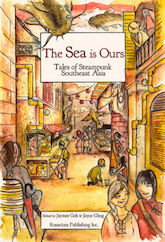 Like a lot of other people, I read and absolutely loved the Three Body Problem series, and I’m thrilled the enormous world of Chinese SF has started getting more exposure in the West. But, especially as someone who identifies as ethnically Chinese myself, I think it’s important to be conscious that Asia and Asian media isn’t just China, Japan, and Korea.
Like a lot of other people, I read and absolutely loved the Three Body Problem series, and I’m thrilled the enormous world of Chinese SF has started getting more exposure in the West. But, especially as someone who identifies as ethnically Chinese myself, I think it’s important to be conscious that Asia and Asian media isn’t just China, Japan, and Korea.
I’ve been meaning to read The SEA is Ours for ages, and I’m so, so glad I did. It’s an anthology of steampunk short stories by Southeast Asian authors, and it is fabulous. I’ve rarely read an anthology that worked for me so consistently across all the stories—they dug hard into my emotions and brought to life richly painted tales starring a broad diversity of complex, wonderful characters. Another quality all the stories shared was a stunning sense of place—they take place across Southeast Asia, and each author made me feel their setting vividly. The steampunk elements are varied and creative, and I very much enjoyed seeing how some of the authors took on a dialogue with history, deconstructing colonialism or reimagining global relationships.
By the time each story ended, I didn’t want it to be done, and with a lot of them I had to sit for a minute just feeling my feelings. You don’t want to miss this anthology.
North America
Trail of Lightning, by Rebecca Roanhorse
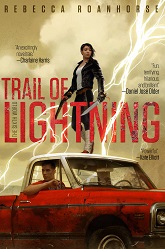 I think it’s very appropriate that I represent North America in this post with a book by an Indigenous author. Rebecca Roanhorse took home the Campbell Award for Best New Writer this year, and heck but she deserves it!
I think it’s very appropriate that I represent North America in this post with a book by an Indigenous author. Rebecca Roanhorse took home the Campbell Award for Best New Writer this year, and heck but she deserves it!
Trail of Lightning starts off with a bang—I won’t spoil it, but read the opening and then tell me if you’re capable of putting it down. The worldbuilding constructs one of the most creative and interesting dystopias I’ve yet read, the characters are each individually brilliant, and the descriptive prose is to die for.
Also, if you’re reading this article because you like my Cas Russell books—in particular, if you like that they have a badass, mercenary female lead—I can bet you’ll fall head over heels for Trail of Lighting’s Maggie Hoskie.
Europe
Dreams From Beyond: An Anthology of Czech Speculative Fiction, edited by Julie Nováková
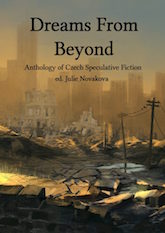 We’ve all read tons of books by European authors! But non-Anglophone Europe has a lot less access to the mainstream Western SFF market. Thanks to the SF In Translation website, I’ve been finding a lot more European SFF in translation to add to my TBR list.
We’ve all read tons of books by European authors! But non-Anglophone Europe has a lot less access to the mainstream Western SFF market. Thanks to the SF In Translation website, I’ve been finding a lot more European SFF in translation to add to my TBR list.
Dreams From Beyond is an anthology of Czech science fiction and fantasy. I found the reading experience captivating, partially because I felt like I could tell I was reading in a different literary tradition, one that might be responding to cultural and literary touchstones I was missing. It made me want to read a literary analysis of all the stories and then read them again.
The stories were all different in topic and theme, but one quality they seemed to share was a certain subtlety, not spelling out for the reader how each subsequent section built on what was happening. Personally, I love this (though one criticism I get from people sometimes is that my own stories are too subtle!). I don’t know if this is common in Czech literary tradition or reflects the tastes of the editor, but it made reading each story feel like an unfolding flower.
You can download Dreams From Beyond for free and get a taste of Czech speculative fiction!
South America
Kalpa Imperial, by Angélica Gorodischer, translated by Ursula K. Le Guin
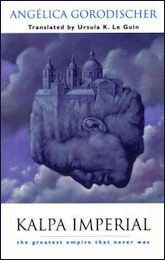 Like I said at the beginning of this post, I actually read Kalpa Imperial a while ago, and it’s part of encouraged me to start seeking out more geographically diverse SFF and more SFF in translation. But I still want to recommend it here, because it’s stuck with me hard even a few years later, and I think it’s a wildly under-recommended book.
Like I said at the beginning of this post, I actually read Kalpa Imperial a while ago, and it’s part of encouraged me to start seeking out more geographically diverse SFF and more SFF in translation. But I still want to recommend it here, because it’s stuck with me hard even a few years later, and I think it’s a wildly under-recommended book.
Kalpa Imperial is the story of “The Greatest Empire That Never Was,” and it’s an intricate, many-multi-generational tale about the history of an invented secondary world. And it’s fascinating. It works like a frame story, with each new chapter about different characters in a different place in history, slowly layering together the broad picture of a vast, sprawling empire.
And the translation is absolutely brilliant. Some translations I’ve read, I find myself giving allowances for awkwardness in the narrative because I’m assuming I’m hitting translation artifacts. But as might be expected of the late great Ursula K. Le Guin, Kalpa Imperial’s English rendering is straight-up gorgeous. Calling the translation “flawless” would be too neutral a word—because translation isn’t about some exact right and wrong, but about bringing so much more nuance and beauty to life, and reading Gorodischer’s prose as translated by Le Guin is like drinking an elixir of life.
If you’re looking to read around the world, I don’t think you could go wrong starting with any one of these.
 S.L. Huang has a math degree from MIT and is a weapons expert and professional stuntwoman who has worked in Hollywood on Battlestar Galactica and a number of other productions. Her novels include the Cas Russell series—a new edition of book one, Zero Sum Game, is available from Tor Books. Her short fiction has appeared in Strange Horizons, Nature, Daily Science Fiction, and The Best American Science Fiction & Fantasy 2016.
S.L. Huang has a math degree from MIT and is a weapons expert and professional stuntwoman who has worked in Hollywood on Battlestar Galactica and a number of other productions. Her novels include the Cas Russell series—a new edition of book one, Zero Sum Game, is available from Tor Books. Her short fiction has appeared in Strange Horizons, Nature, Daily Science Fiction, and The Best American Science Fiction & Fantasy 2016.










